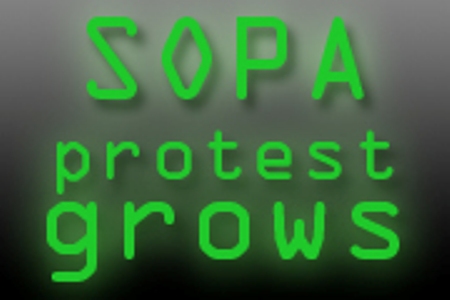If you are wondering what SOPA is then you probably didn’t Wikipedia last week when it shutdown in protest. SOPA is a bill which the UScongress wanted to pass and it stands for Stop Online Piracy Act (SOPA).
It sounds harmless enough, after all we all want to stop piracy…don’t we! While we are against piracy we certainly aren’t against FREE SPEECH and SOPA takes it too far suggesting a China like authoritarian rule where record labels and cable companies have the power to shut down website because of alleged piracy acts, no matter how small the piracy act is….it may be as simple as you uploading a video of you and your family at a family bar-b-que with Lady Gaga playing in the background. You may be in violation and your website may be shut down.
Still not convinced, here are 5 reasons why SOPA needs to die…
1. It kills Free Speech
The act is so broad that if you have a link that points to copyrighted content posted by a user making a point about something completely unrelated, your website can be shut down. YouTube would shut down tomorrow, it won’t be able to exist because it would be in constant violation, not because of YouTube but because there may be 1 person in the multitude of people who post videos with copyright content. Wikipedia would cease to exist because its links to a website that has questionable content. Even myCELLmyTERMS would be subject to these same rules based on an innocent link posted by one of our users.
This anti-piracy battle may nearly be won, but the war isn’t over
SOPA would lead to ‘Mad Max’-style Darknet [ExpressIT]
Anti-SOPA protesters relentless after Web strike
2. It does NOT Stop Piracy
This is a case of anti-piracy theater, where ordinary people like you and me get caught in the web. Real pirates are so sophisticated that if you shut them down, they are back up in hours and have several ways at their disposal at getting around road blocks. This acts affect us more than it affects them.
3. It puts the power back in the hands of the 1 per cent
The people who benefit the so called content providers, like the Movie studios, Cable companies, Record labels would dictate which websites can survive and which should be shut down. Now why would we want to give them so much power to dictate how we live our lives. The Internet is a domain for everyone and its the one place where everyone has a voice.
4. SOPA affects other countries too, even Canada
This proposed law would give the US Government such broad powers that they can damage websites outside of theUSlikeCanada. Since most Canadian websites are managed by a registry in theUS, this bills directly affects us. The US Government would have the ability to demand that US domain registrars block sites which it may deem in violation and the process of blocking these sites will affect almost every single website connected those domains – in essence blacking out the rest of the Internet based on the US Government’s fancy.
5. We would lose our right to protest in anonymity
SOPA is against, rather prohibits, the use of tools to get around any blocks put up by the US Government. Incidentally, these same tools allow activists and protesters from countries likeNorth KoreaorSyriato protest freely without being discovered. Banning these tools has the unwanted effect of limiting protest against injustice around the world.
Still not convinced, then check out Wikipedia’s protest against SOPA and show your support for this movement.
Yale Holder is a co-founder of MyCellMyTerms, a Toronto company that helps cell phone users negotiate better plans with. their carriers.





